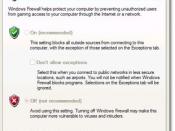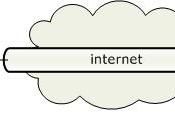Most companies need to be able to access their work from many locations, including home and while traveling. The solution that allows them to access the network is one of two ways to access their network. The first is through a VPN (virtual private network) that allows the user access to remotely log in easily and quickly. The other way is through a dial up remote connection; this way is a bit easier to set up but can become very costly in the long run. The problem with being able to do this is it can be very costly and can eat up much of the IT departments time to set up, configure and implement this system into the current hardware.
The definition from whatis.com about a VPN is " virtual private network (VPN) is a network that uses a public telecommunication infrastructure, such as the Internet, to provide remote offices or individual users with secure access to their organization's network.
A virtual private network can be contrasted with an expensive system of owned or leased lines that can only be used by one organization. The goal of a VPN is to provide the organization with the same capabilities, but at a much lower cost. VPN works by using the shared public infrastructure while maintaining privacy through security procedures and tunneling protocols such as the Layer Two Tunneling Protocol (L2TP). In effect, the protocols, by encrypting data at the sending end and decrypting it at the receiving end, send the data through a "tunnel" that cannot be "entered" by data that is not properly encrypted. An additional level of security involves encrypting not only the data, but also the originating and receiving network addresses."A VPN, also known as a Virtual Private Network is a helpful tool that allows users of...


